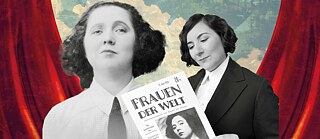Instagram series Claire Waldoff: The non-conformist icon

German singer and cabaret artist Claire Waldoff extolled feminism, free love and a free life earlier than many others. She preferred to perform in men's clothing and shaped the Berlin cabaret scene of the Golden Twenties with her unmistakable voice - until the National Socialists made her performances impossible. However, she remains a role model for many stage actors to this day.
When the English poet W. H. Auden moved to Berlin with his friend Christopher Isherwood in 1928, the pair were attracted more than anything else by the city’s free and easy nightlife. Auden considered Berlin to be a dream for homosexuals, and Isherwood recorded his impressions in his Berlin Stories, on which he later based his musical Cabaret. These were the years when the city on the River Spree attracted not only Auden and Isherwood, but many other people from all corners of the globe. Berlin was regarded as the queer scene’s El Dorado, with some 170 gay bars and clubs advertising extravagant travesty shows and permissive dancing. City guidebooks with titles such as Guide to Wicked Berlin or Berlin’s Lesbian Women were printed for curious tourists.At the heart of this vibrant queer scene was the singer Claire Waldoff, an iconic reveller. 1920s trends were nothing new for her as she had taken up that lifestyle long before. She had donned a man’s suit and top hat in performances back in 1907, despite interference from Prussian Police Department censors. She and her partner Olga (Olly) von Roeder were living together before World War I. Waldoff was a pioneer of unconventionality although it would have been much more likely for her life to have taken a completely different course.
The rebellious little miss from the Lower Rhine
Claire Waldoff, whose real name was Clara Wortmann, was born in 1884. The daughter of a miner in Gelsenkirchen, she was the eleventh of 16 children. In this milieu, an academic education was not something to be taken for granted. However, at the age of 14, she applied to one of the first grammar schools for girls in the German Reich, in Hanover, founded by women’s rights advocate Helene Lange. An equal education for boys and girls fitted in with Clara’s plan to complete her schooling and study medicine. But before long, she had dropped out of grammar school in Hanover and tried her luck in the theatre instead. What fascinated her there more than anything else was that roles are no more fixed than life paths and identities. She changed her name from Clara Wortmann to Claire Waldoff, cut off her pigtails and had her hair cut in jaunty pageboy style. She took to the stage, acquiring stagecraft skills in the theatres of Bad Pyrmont and Kattowitz. Having cut out a role for herself as a rebellious little miss, she made her breakthrough on Berlin’s cabaret stages in 1907.She belted out her songs in a roaring attack, coming across as down-to-earth and anarchical at the same time.
The audience loved her right from the start, and she was soon regarded as a “folk singer“. She sang of cooks, servants and sales assistants, and philosophised about love, desire and rebellion. Her performances were different and extraordinary in every way. Consistently avoiding the coquetry typically cultivated by chanson singers of the time, she belted out her songs in a roaring attack, coming across as down-to-earth and anarchical at the same time. Switching genders with panache, she gave expression to both female and male ego identities. In the song “Hannelore”, for examples, she sang about blurring gender barriers and playing games with identities - Hannelore goes to bed with both men and women and no one knows her gender.
Waldoff gave short shrift to anyone who projected onto her clichés such as femme fatale or femme fragile. This emerges very clearly in “Nach meine Beene is ja janz Berlin verrückt“ (The whole of Berlin is crazy about my legs), a song Marlene Dietrich later included in her repertoire. What Dietrich, with her lascivious voice, made into an erotic number, Waldoff slammed down ironically in front of her audience. Instead of using her voice or body to go through the motions of seduction, she highlighted the discrepancy between the song’s lyrics, which present her as a vamp bent on men’s downfall, and her level-headed demeanour, which debunks the femme fatale myth as a male fantasy.
Between censorship and feminism
Time and again, Waldoff faced problems with censorship, and was even summoned to court because some of her songs were “detrimental to morality“. She refused to be intimidated, however, either at work or in her private life. She lived her sexual orientation and refused to be patronised by social conventions. During the imperial period, it was by no means to be taken for granted that she would publicly acknowledge her great love Olly von Roeder because the Wilhelmine judiciary was discussing whether to apply Paragraph 175, the prohibition of “unnatural fornication“ between men, to lesbian relationships as well.
Claire Waldoff’s song repertoire includes loud political feminism, for example in her classic song of 1926: ”Chuck all the men out of the Reichstag,/ and chuck all the men out of the Landtag,/ and chuck all the men out of the mansion,/ we’ll make it into a women’s shelter!”
Withdrawal into private life
“The word fear was never in my dictionary“, Claire Waldoff once said. But the Nazi period robbed even a woman of her stature of her apparently indestructible optimism. In 1933, she was issued with a stage ban, but it was withdrawn again shortly afterwards. Attacking such a prominent and popular artist would have cost the regime some of its popularity. However, the Brownshirts kept a sharp eye on her as a feminist and lesbian. Complaints were repeatedly made about her by Nazis who toed the party line: “What sheer Jewish impertinence that this woman should speak of decency when the previous system let her write and compose explicit contents and double entendres, and perform them every evening in a voice abhorrent to German ears in Jewish variety shows and cabarets owned by stinking Jews,“ said a party member from Mühlheim an der Ruhr in 1935.
Waldoff tried to make the best of things, muddling her way through and giving her Jewish composers German names as required by the Nazis. She could not bring herself to emigrate - her songs were tied too closely to the German language, and singing was something too close to her heart. As the number of her performances dwindled in the late 1930s, she left Berlin and, with Olly von Roeder, moved to a small summer house near Bad Reichenhall.
She did not make a comeback after the war. In comparison with the latest American hits, her couplets seemed outdated, and folk singers were now seen as an anachronism. In her few post-war interviews, Waldoff seems broken and bitter, and ravaged by strokes. There was no question of her returning to Berlin; her Berlin apartment had been bombed. Impoverished, she spent the last years of her life near Bad Reichenhall, where she died in 1957. Her great love, Olly von Roeder, died six years later. They are buried together in a cemetery in Stuttgart.
Claire Waldoff encouraged people not to bend to the demands of convention. That was the source of her strength and remains so to this day.
Instagram-Series on Claire Waldoff
 Carolin Karnuth as Claire Waldoff in the Instagram series of the @goetheinstitut | Foto: © Florian Mag, art/beats
| Foto: © Florian Mag, art/beats
The nineteen-twenties cabaret artist, played by Carolin Karnuth, confronts social policy issues and queer themes in semi-fictional film sequences in the audio-visual Instagram series “Chuck all the men out of the Reichstag!”. It starts on 8 March, International Women’s Day, on the Goethe-Institut's Instagram Channel
Carolin Karnuth as Claire Waldoff in the Instagram series of the @goetheinstitut | Foto: © Florian Mag, art/beats
| Foto: © Florian Mag, art/beats
The nineteen-twenties cabaret artist, played by Carolin Karnuth, confronts social policy issues and queer themes in semi-fictional film sequences in the audio-visual Instagram series “Chuck all the men out of the Reichstag!”. It starts on 8 March, International Women’s Day, on the Goethe-Institut's Instagram Channel